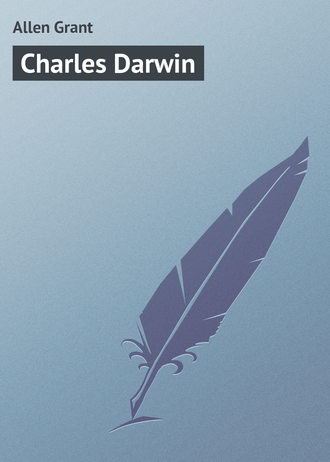 полная версия
полная версияCharles Darwin
Yet another factor in the intellectual stir and bustle of the time must needs be mentioned even in so short and cursory a sketch as this of the causes which led to the Darwinian crisis. In 1798, Thomas Malthus, a clergyman of the Church of England, published the first edition of his famous and much-debated 'Essay on the Principle of Population.' Malthus was the first person who ever called public attention to the tendency of population to increase up to the utmost limit of subsistence, as well as to the necessary influence of starvation in checking its further development beyond that point. Though his essay dealt only with the question of reproduction in human societies, it was clear that it possessed innumerable analogies in every domain of animal and vegetable life. The book ran through many successive editions with extraordinary rapidity for a work of its class, it was fiercely attacked and bravely defended, it caused an immense amount of discussion and debate, and besides its marvellous direct influence as a germinal power upon the whole subsequent course of politico-economical and sociological thought, it produced also a remarkable indirect influence on the side current of biological and speculative opinion. In particular, as we shall more fully see hereafter, it had an immediate effect in suggesting to the mind of the great naturalist who forms our present subject the embryo idea of 'natural selection.'
Such then was the intellectual and social world into which, early in the present century, Charles Darwin found himself born. Everywhere around him in his childhood and youth these great but formless evolutionary ideas were brewing and fermenting. The scientific society of his elders and of the contemporaries among whom he grew up was permeated with the leaven of Laplace and of Lamarck, of Hutton and of Herschel. Inquiry was especially everywhere rife as to the origin and nature of specific distinctions among plants and animals. Those who believed in the doctrine of Buffon and of the 'Zoonomia' and those who disbelieved in it, alike, were profoundly interested and agitated in soul by the far-reaching implications of that fundamental problem. On every side evolutionism, in its crude form, was already in the air. Long before Charles Darwin himself published his conclusive 'Origin of Species,' every thinking mind in the world of science, elder and younger, was deeply engaged upon the self-same problem. Lyell and Horner in alternate fits were doubting and debating. Herbert Spencer had already frankly accepted the new idea with the profound conviction of a priori reasoning. Agassiz was hesitating and raising difficulties. Treviranus was ardently proclaiming his unflinching adhesion. Oken was spinning in metaphysical Germany his fanciful parodies of the Lamarckian hypothesis. Among the depths of Brazilian forests Bates was reading the story of evolution on the gauze-like wings of tropical butterflies. Under the scanty shade of Malayan palm-trees Wallace was independently spelling out in rude outline the very theory of survival of the fittest, which Charles Darwin himself was simultaneously perfecting and polishing among the memoirs and pamphlets of his English study. Wollaston in Madeira was pointing out the strange adaptations of the curious local snails and beetles. Von Buch in the Canaries was coming to the conclusion that varieties may be slowly changed into permanent species. Lecoq and Von Baer were gradually arriving, one by the botanical route, the other by the embryological, at the same opinion. Before Charles Darwin was twenty, Dean Herbert had declared from the profound depth of his horticultural knowledge that kinds were only mere fixed sports; and Patrick Matthew, in the appendix to a work on 'Naval Timber,' had casually developed, without perceiving its importance, the actual distinctive Darwinian doctrine of natural selection. Robert Chambers published in 1844 his 'Vestiges of Creation,' in which Lamarck's theory was impressed and popularised under a somewhat spoilt and mistaken form: it was not till 1859 that the first edition of the 'Origin of Species' burst like a thunderbolt upon the astonished world of unprepared and unscientific thinkers.
This general attitude of interest and inquiry is of deep importance to the proper comprehension of Charles Darwin's life and work, and that for two distinct reasons. In the first place, the universal stir and deep prying into evolutionary questions which everywhere existed among scientific men in his early days was naturally communicated to a lad born of a scientific family, and inheriting directly in blood and bone the biological tastes and tendencies of Erasmus Darwin. In the second place, the existence of such a deep and wide-spread curiosity as to ultimate origins, and the common prevalence of profound uniformitarian and evolutionary views among philosophers and thinkers, made the acceptance of Charles Darwin's particular theory, when it at last arrived, a comparatively easy and certain matter, because by it the course of organic development was assimilated, on credible grounds, to the course of all other development in general, as then already widely recognised. The first consideration helps us to account in part for the man himself; the second consideration helps us even more to account for the great work which he was enabled in the end so successfully to accomplish.
CHAPTER II
CHARLES DARWIN AND HIS ANTECEDENTS
From the environment let us turn to the individual; from the world in which the man moved to the man who moved in it, and was in time destined to move it.
Who was he, and whence did he derive his exceptional energy and intellectual panoply?
Erasmus Darwin, the grandfather, the first of the line in whom the distinctive Darwinian strain of intellect overtly displayed itself, was the son of one Robert Darwin, a gentleman of Nottinghamshire, 'a person of curiosity,' with 'a taste for literature and science;' so that for four generations at least, in the paternal line, the peculiar talents of the Darwin family had been highly cultivated in either direction. Robert Darwin was an early member of the Spalding Club, a friend of Stukeley the antiquary, and an embryo geologist, after the fantastic, half-superstitious fashion of his own time. Of his four sons, both Robert, the eldest, and Erasmus, the youngest, were authors and botanists. Erasmus himself was a Cambridge man, and his natural bent of mind and energy led him irresistibly on to the study of medicine. Taking his medical degree at his own university, and afterwards preparing for practice by attending Hunter's lectures in London, besides going through the regular medical course at Edinburgh, the young doctor finally settled down as a physician at Nottingham, whence shortly afterward he removed to Lichfield, then the centre of a famous literary coterie. So large a part of Charles Darwin's remarkable idiosyncrasy was derived by heredity from his paternal grandfather, that it may be worth while to dwell a little here in passing on the character and career of this brilliant precursor of the great evolutionist. Both in the physical and in the spiritual sense, Erasmus Darwin was one among the truest and most genuine ancestors of his grandson Charles.
A powerful, robust, athletic man, in florid health and of temperate habits, yet with the full-blooded tendency of the eighteenth century vividly displayed in his ample face and broad features, Erasmus Darwin bubbled over with irrepressible vivacity, the outward and visible sign of that overflowing energy which forms everywhere one of the most marked determining conditions of high genius. Strong in body and strong in mind, a teetotaler before teetotalism, an abolitionist before the anti-slavery movement, he had a great contempt for weaknesses and prejudices of every sort, and he rose far superior to the age in which he lived in breadth of view and freedom from preconceptions. The eighteenth century considered him, in its cautious, cut-and-dried fashion, a man of singular talent but of remarkably eccentric and unsafe opinions. Unfortunately for his lasting fame, Dr. Darwin was much given to writing poetry; and this poetry, though as ingenious as everything else he did, had a certain false gallop of verse about it which has doomed it to become since Canning's parody a sort of warning beacon against the worst faults of the post-Augustan decadence in the ten-syllabled metre. Nobody now reads the 'Botanic Garden' except either to laugh at its exquisite extravagances, or to wonder at the queer tinsel glitter of its occasional clever rhetorical rhapsodies.
But in his alternative character of philosophic biologist, rejected by the age which swallowed his poetry all applausive, Erasmus Darwin is well worthy of the highest and deepest respect, as a prime founder and early prophet of the evolutionary system. His 'Zoonomia,' 'which, though ingenious, is built upon the most absurd hypothesis' – as men still said only thirty years ago – contains in the germ the whole theory of organic development as understood up to the very moment of the publication of the 'Origin of Species.' In it Dr. Darwin calls attention to 'the great changes introduced into various animals by artificial or accidental cultivation,' a subject afterwards fully elucidated by his greater grandson in his work on 'The Variation of Animals and Plants under Domestication.' He specially notes 'the immense changes of shape and colour' produced by man in rabbits and pigeons, the very species on which Charles Darwin subsequently made some of his most remarkable and interesting observations. More than any previous writer, Erasmus Darwin, with 'prophetic sagacity,' insisted strongly on the essential unity of parent and offspring – a truth which lies at the very base of all modern philosophical biology. 'Owing to the imperfection of language,' wrote the Lichfield doctor nearly a hundred years ago, 'the offspring is termed a new animal, but is in truth a branch or elongation of the parent, since a part of the embryon-animal is or was a part of the parent, and therefore may retain some of the habits of the parent system.' He laid peculiar stress upon the hereditary nature of some acquired properties, such as the muscles of dancers or jugglers, and the diseases incidental to special occupations. Nay, he even anticipated his great descendant in pointing out that varieties are often produced at first as mere 'sports' or accidental variations, as in the case of six-fingered men, five-clawed fowls, or extra-toed cats, and are afterwards handed down by heredity to succeeding generations. Charles Darwin would have added that if these new stray peculiarities happened to prove advantageous to the species they would be naturally favoured in the struggle for existence, while if they proved disadvantageous, or even neutral, they would die out at once or be bred out in the course of a few crosses. That last truth of natural selection was the only cardinal one in the evolutionary system on which Erasmus Darwin did not actually forestall his more famous and greater namesake. For its full perception, the discovery of Malthus had to be collated with the speculations of Buffon.
'When we revolve in our minds,' says the eighteenth century prophet of evolution, 'the great similarity of structure which obtains in all the warm-blooded animals, as well quadrupeds, birds, and amphibious animals, as in mankind; from the mouse and bat to the elephant and whale; one is led to conclude that they have alike been produced from a similar living filament. In some this filament in its advance to maturity has acquired hands and fingers with a fine sense of touch, as in mankind. In others it has acquired claws or talons, as in tigers and eagles. In others, toes with an intervening web or membrane, as in seals and geese. In others it has acquired cloven hoofs, as in cows and swine; and whole hoofs in others, as in the horse: while in the bird kind this original living filament has put forth wings instead of arms or legs, and feathers instead of hair.' This is a very crude form of evolutionism indeed, but it is leading up by gradual stages to the finished and all-sided philosophy of physical life, which at last definitely formulates itself through the mouth of Charles Darwin. We shall see hereafter wherein Erasmus Darwin's conception of development chiefly failed – in attributing evolution for the most part to the exertions and endeavours of the animal itself, rather than to inevitable survival of the fittest among innumerable spontaneous variations – but we must at least conclude our glimpse of his pregnant and suggestive work by quoting its great fundamental aperçu: – 'As the earth and ocean were probably peopled with vegetable productions long before the existence of animals, and many families of these animals long before other families of them, shall we conjecture that one and the same kind of living filament is and has been the cause of all organic life?'
A few lines from the 'Temple of Nature,' one of Erasmus Darwin's poetic rhapsodies, containing his fully matured views on the origin of living creatures, may be worth reproduction in further elucidation of his philosophical position: —
'Organic life beneath the shoreless wavesWas born, and nursed in ocean's pearly caves;First forms minute, unseen by spheric glass.Move on the mud, or pierce the watery mass;These, as successive generations bloom,New powers acquire, and larger limbs assume;Whence countless groups of vegetation spring,And breathing realms of fin and feet and wing.'Have we not here the very beginnings of Charles Darwin? Do we not see, in these profound and fundamental suggestions, not merely hints as to the evolution of evolution, but also as to the evolution of the evolutionist?
On the other hand, though Erasmus Darwin defined a fool to his friend Edgeworth as 'a man who never tried an experiment in his life,' he was wanting himself in the rigorous and patient inductive habit which so strikingly distinguished his grandson Charles. That trait, as we shall presently see, the biological chief of the nineteenth century derived in all probability from another root of his genealogical tree. Erasmus Darwin gave us brilliant suggestions rather than cumulative proof: he apologised in his 'Zoonomia' for 'many conjectures not supported by accurate investigation or conclusive experiments,' Such an apology would have been simply impossible to the painstaking spirit of his grandson Charles.
Erasmus Darwin was twice married. His first wife was Mary, daughter of Mr. Charles Howard, of Lichfield, and it was her son, Robert Waring Darwin, who became the father of our hero, Charles. It is fashionable to say, in this and sundry other like cases, that the mental energy skips a generation. People have said so in the case of that intermediate Mendelssohn who was son of Moses Mendelssohn, the philosopher, and father of Felix Bartholdy Mendelssohn, the composer – that mere link in a marvellous chain who was wont to observe of himself in the decline of life, that in his youth he was called the son of the great Mendelssohn, and in his old age the father of the great Mendelssohn. As a matter of fact, one may fairly doubt whether such a case of actual skipping is ever possible in the nature of things. In the particular instance of Robert Waring Darwin at least we may be pretty sure that the distinctive Darwinian strain of genius lay merely latent rather than dormant: that it did not display itself to the world at large, but that it persisted silently as powerful as ever within the remote recesses of the thinking organism. Not every man brings out before men all that is within him. Robert Waring Darwin was a physician at Shrewsbury; and he attained at least sufficient scientific eminence in his own time to become a Fellow of the Royal Society, in days when that honour was certainly not readily conferred upon country doctors of modest reputation. Charles Darwin says of him plainly, 'He was incomparably the most acute observer whom I ever knew.' It may well have been that Robert Darwin lived and died, as his famous son lived for fifty years of his great life, in comparative silence and learned retirement; for we must never forget that if Charles Darwin had only completed the first half century of his laborious existence, he would have been remembered merely as the author of an entertaining work on the voyage of the 'Beagle,' a plausible theory of coral islands, and a learned monograph on the fossil barnacles. During all those years, in fact, he had really done little else than collect material for the work of his lifetime. If we judge men by outward performance only, we may often be greatly mistaken in our estimates: potentiality is wider than actuality; what a man does is never a certain or extreme criterion of what he can do.
The Darwins, indeed, were all a mighty folk, of varied powers and varied attainments. Erasmus's brother, Robert, was the author of a work on botany, which long enjoyed a respectable repute. Of his sons, one, Sir Francis Darwin, was noted as a keen observer of animals; a second, Charles, who died at twenty-one, was already the author of a very valuable medical essay; while the third, Robert, was the Shrewsbury F.R.S., the father of our great evolutionary thinker. And among Charles Darwin's own cousins, one is Mr. Hensleigh Wedgwood, the philologist; a second was the late Sir Henry Holland; and a third is Mr. Francis Galton, the author of that essentially Darwinian book, 'Hereditary Genius.'
Robert Waring Darwin took to himself a wife from another very great and eminent family. He married Susannah Wedgwood, daughter of Josiah Wedgwood, the famous potter; and from these two silent representatives of powerful stocks, Charles Robert Darwin, the father of modern evolutionary biology, was born at Shrewsbury, on February the 12th, 1809. That Wedgwood connection, again, is no mere casual or unimportant incident in the previous life-history of the Darwinian originality; it throws a separate clear light of its own upon the peculiar and admirably compounded idiosyncrasy of Charles Darwin.
A man, indeed, owes on the average quite as much to his mother's as to his father's family. It is a mere unscientific old-world prejudice which makes us for the most part count ancestry in the direct ascending male line alone, to the complete neglect of the equally important maternal pedigree. Prom the biological point of view, at least, every individual is a highly complex compound of hereditary elements, a resultant of numerous converging forces, a meeting place of two great streams of inheritance, each of which is itself similarly made up by the like confluence of innumerable distinct prior tributaries. Between these two it is almost impossible for us accurately to distribute any given individuality. How much Charles Darwin owed to the Darwins, and how much he owed in turn to the Wedgwoods, no man is yet psychologist enough or physiologist enough to say. But that he owed a great deal to either strong and vigorous strain we may even now quite safely take for granted.
The Wedgwood family were 'throwers' by handicraft, superior artisans long settled at Burslem, in the Staffordshire potteries. Josiah, the youngest of thirteen children, lamed by illness in early life, was turned by this happy accident from his primitive task as a 'thrower' to the more artistic and original work of producing ornamental coloured earthenware. Skilful and indefatigable, of indomitable energy and with great powers of forcing his way in life against all obstacles, young Wedgwood rose rapidly by his own unaided exertions to be a master potter, and a manufacturer of the famous unglazed black porcelain. Those were the darkest days of industrial art and decorative handicraft in modern England. Josiah Wedgwood, by his marked originality and force of character, succeeded in turning the current of national taste, and creating among us a new and distinctly higher type of artistic workmanship. His activity, however, was not confined to his art alone, but found itself a hundred other different outlets in the most varied directions. When his potteries needed enlargement to meet the increased demand, he founded for the hands employed upon his works the model industrial village of Etruria. When Brindley began cutting artificial waterways across the broad face of central England, it was in the great potter that he found his chief ally in promoting the construction of the Grand Trunk Canal. Wedgwood, indeed, was a builder of schools and a maker of roads; a chemist and an artist; a friend of Watt and an employer of Flaxman. In short, like Erasmus Darwin, he possessed that prime essential in the character of genius, an immense underlying stock of energy. And with it there went its best concomitant, the 'infinite capacity for taking pains.' Is it not probable that in their joint descendant, the brilliant but discursive and hazardous genius of Erasmus Darwin was balanced and regulated by soberer qualities inherited directly from the profound industry of the painstaking potter? When later on we find Charles Darwin spending hours in noting the successive movements of the tendrils in a plant, or watching for long years the habits and manners of earthworms in flower-pots, may we not reasonably conjecture that he derived no little share of his extraordinary patience, carefulness, and minuteness of handicraft from his mother's father, Josiah Wedgwood?
Such, then, were the two main component elements, paternal and maternal, from which the striking personality of Charles Darwin was no doubt for the most part ultimately built up.
CHAPTER III
EARLY DAYS
As the Chester express steams out of Shrewsbury station, you see on your left, overhanging the steep bank of Severn, a large, square, substantial-looking house, known as the Mount, the birthplace of the author of the 'Origin of Species.' There, in the comfortable home he had built for himself, Dr. Robert Darwin, the father, lived and worked for fifty years of unobtrusive usefulness. He had studied medicine at Edinburgh and Leyden, and had even travelled a little in Germany, before he settled down in the quiet old Salopian town, where for half a century his portly figure and yellow chaise were familiar objects of the country-side for miles around. Among a literary society which included Coleridge's friends, the Tayleurs, and where Hazlitt listened with delight to the great poet's 'music of the spheres,' in High Street Unitarian Chapel, the Mount kept up with becoming dignity the family traditions of the Darwins and the Wedgwoods as a local centre of sweetness and light.
On February the 12th, 1809, Charles Darwin first saw the light of day in this his father's house at Shrewsbury. Time and place were both propitious. Born in a cultivated scientific family, surrounded from his birth by elevating influences, and secured beforehand from the cramping necessity of earning his own livelihood by his own exertions, the boy was destined to grow up to full maturity in the twenty-one years of slow development that immediately preceded the passing of the first Reform Act. The thunder of the great European upheaval had grown silent at Waterloo when he was barely six years old, and his boyhood was passed amid country sights and sounds during that long period of reconstruction and assimilation which followed the fierce volcanic outburst of the French Revolution. Happy in the opportunity of his birth, he came upon the world eight years after the first publication of Lamarck's remarkable speculations, and for the first twenty-two years of his life he was actually the far younger contemporary of the great French evolutionary philosopher. Eleven years before his arrival upon the scene Malthus had set forth his 'Principle of Population.' Charles Darwin thus entered upon a stage well prepared for him, and he entered it with an idiosyncrasy exactly adapted for making the best of the situation. The soil had been thoroughly turned and dressed beforehand: Charles Darwin's seed had only to fall upon it in order to spring up and bear fruit a hundredfold, in every field of science or speculation.
For it was not biology alone that he was foredoomed to revolutionise, but the whole range of human thought, and perhaps even ultimately of human action.
Is it mere national prejudice which makes one add with congratulatory pleasure that Darwin was born in England, rather than in France, in Germany, or in America? Perhaps so; perhaps not. For the English intellect does indeed seem more capable than most of uniting high speculative ability with high practical skill and experience: and of that union of rare qualities Darwin himself was a most conspicuous example. It is probable that England has produced more of the great organising and systematising intellects than any other modern country.









